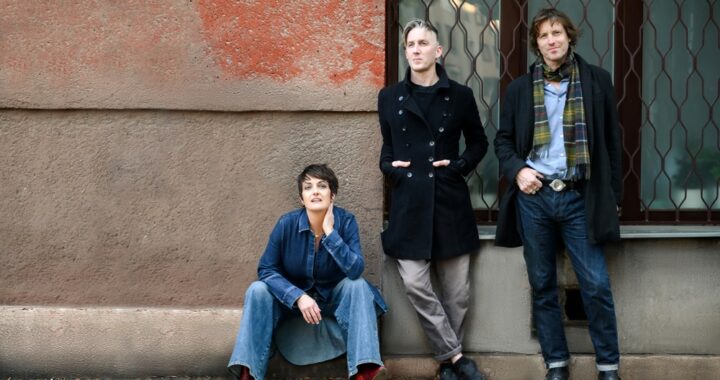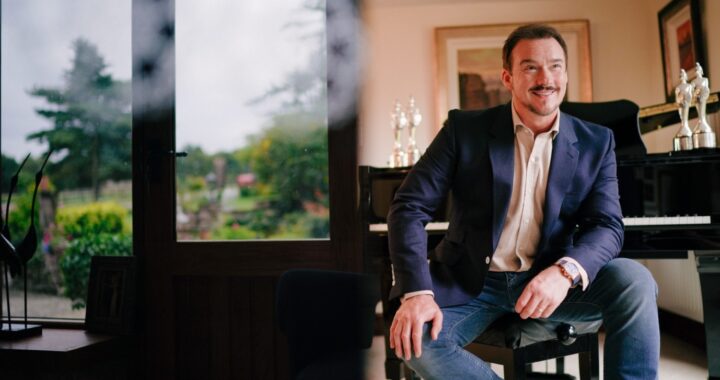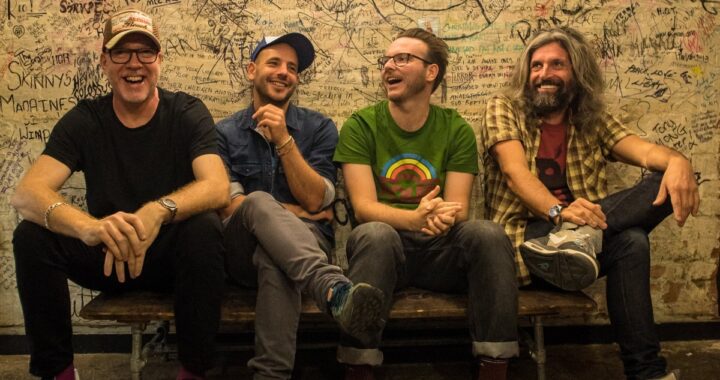Interview: The Jezabels
8 min read
Since their formation in 2007, The Jezabels have won critical acclaim for their debut album Prisoner and thrilling live shows. Described as alternative rock, indie and disco pop, this band marches to their own unique ‘intensindie’ beat. After two years of touring and writing in the UK, the Australian quartet released their much anticipated second album The Brink earlier this year.
We caught up with lead singer Hayley Mary to discuss this new album, living in the UK and the origins of The Jezabels. Here is what she had to say:
Melissa Redman: How are you doing and where in the world does this interview find you?
Hayley Mary: Well, thank you. I am in a truck stop just outside Dublin.
 MR: How did you come up with the name The Jezabels?
MR: How did you come up with the name The Jezabels?
HM: Well, it’s in the bible, but my dad always wanted me to be in a band called the Jezabels (actually he wanted to call me Jezabel, but my mum wouldn’t let him). When Heather and I started playing together in high school we just started call ourselves that without much thought, and because it had a good ring to it. When the guys joined the band in uni, we tried to think of other more suitable names, but The Jezabels just sort of stuck. After a while there I got bored of that story, so I started explaining to people that maybe Jezabel, and many other powerful or subversive women throughout history have been dismissed as whores as a way of undermining them, and that our band name was some kind of feminist reclaiming of the term that has been stigmatised throughout history. It was a pretty uni-student move, but I like to think it’s a little bit true as well.
MR: You’ve described your sound as ‘intensindie’. What does that mean exactly?
HM: It’s indie that’s a little more intense than other indie. What’s indie then, you ask? Fucked if I know. It was also a bit of a tongue in cheek reaction to the fact that critics seemed to really struggle with categorising us (though not much trouble criticising us haha. ) The question of genre continues to pester us to this day, actually. We are an independent band. What ‘indie’ means with regards to sound these days, I have no idea, but I think it involves guitar, which we have. I think Sam just put ‘intensindie’ on our website as a joke and it stuck.
MR: You’ve recently released your second album The Brink. What can you tell us about the album and what were you trying to achieve?
HM: Well we were basically just trying to make a second record that we could tour and wouldn’t ruin our career, and something to make us feel good. Naturally, some people are saying we’ve gone too far one way or another, but when you realise there is no pleasing everyone on your second record, you just resolve to write the record you want to write. It’s probably more pop sensible and more upbeat, because we were less afraid of pop than we used to be, and, I think, because our emotional and physical realities were in a bit of a ‘darker’ place this time round, for various reasons, we made music to pull us out of it, rather than to wallow.
[youtube id=”pQ3fAMOz-Ic” width=”620″ height=”360″]
MR: You have mentioned that The Jezabels are more of a live band, and that many of the songs on The Brink were written with the intention to be played live. Did that make it difficult to record these new songs?
HM: Not difficult as such. In a way, the idea of writing songs that will work live is basically the same as writing stronger songs, that don’t rely as much on production. Not to devalue albums that rely on soundscapes and production, a lot of great records are made that way. That just wasn’t where we were at. Regardless of all the theories you can throw at what songwriting is, there are always those classic definitions that intrigue you as a songwriter, like ‘a song is a melody, lyrics and chords that should stand on it’s own’. I’m not saying we perfected that on this record by any stretch of the imagination, or that production isn’t heavily influential on the sound, because it is, but I guess it’s all relative, and we enjoyed just trying to be better at ‘serving the song’ this time round, for something different, you know?
MR: The album cover for The Brink is quite artistic. How did you come up with the concept for the picture?
HM: Well, it’s not just artistic, It’s straight up art. We had decided that the record we were making had too warm a feel for photography, which we have had previously, and that painting would be a good move. I was talking to Chris Doyle, our graphic designer about some of the ideas in the lyrics and we got talking about the strange crossover between intimacy and alienation that one feels in the internet age (or whatever they’re calling this era we’re in now). Just the idea that our ways of making friends and meeting lovers are also just data that is sold to the security services. I know I felt pretty weird about all the government spying and crap that was in the news last year, but also felt that it was pretty inescapable if you wanted to be ‘part of society’. I kinda hate that catch 22, but I won’t go on a rant.
Anyway, Chris started looking for painting that could depict those kind of ideas, we were thinking we might commission someone, but then he found this Polish artist, Jarek Puczel and we just thought, ‘well two people caught in a romantic pash, but they don’t have faces… intimate, anonymous, alienating, perfect.’ The rest of his stuff was in a similar vein and also amazing , so we contacted him and asked if we could use it.
MR: You have spent a lot of time in London with the recording of The Brink as well as touring a lot in the UK. What has life been like in the UK for the band?
HM: Like I said before, we were in a darker place this time round. That was metaphorical and literal. London is obviously an amazing, beautiful, full of life, world city, and I still choose to live there for now, but it’s also a fucking hard place, with a lot of people who’ve had it pretty rough. And, I suppose, as an outsider anywhere, you just become instantly aware of the history that people carry on their shoulders.
My fathers is Glaswegian and he used to always tell me how I had it easy in Australia. (Not saying everything was rosy as a kid there, and Australia is going down the drain as we speak, I’m talking potentially worse than Thatcher, but that’s another matter ), but in a way, coming to the UK, I could see what he meant. All the things I love about Brits, their humour, their cynicism, their resistance to new fads, to Americanisation. Those are all part of what makes it great to be here. I dunno, it’s like places have a memory, in the land and the people, and the collective memory of this place remembers things that the new world just doesn’t remember, things that places like America and Australia were built on, much later. I met an old man in a bar in Hackney who was convinced that war with Germany was still imminent. I told him he was mad. He later told me that his parents had been killed in the blitz in front of him, it was then I released there would be no telling him that Germany wasn’t the threat we needed to worry about, and how was I to know anyway? That’s kinda what being an Australian band trying to write upbeat optimistic music in London is like.
MR: The last couple of years have been spent on the road. What do you enjoy the most about the life of touring?
HM: I personally enjoy that fact that a room full of people clap for us every night and meeting the people who actually like what we do. When you’re not on tour you only notice the critics, you know, and some of the shit critics say is pretty over the top cruel at times (when you consider that we’re just a rock band, not Saddam Hussein or anything). So I like the road because I can go off into my own world and focus the people we are actually doing this for; ourselves, each other and our fans.
[youtube id=”XRTwz4Z1_ss” width=”620″ height=”360″]
MR: With such a busy schedule, do you get to see your family much or do they get to join you on the road at all?
HM: Not much, no. But there is something about this life that makes you appreciate the things that other people find normal. I like to have a night in a watch a movie or to make dinner in a kitchen. The one or two days a year I see my family are always more reflective than they used to be. I accept them more as people, because I’m always away from them.
MR: You have supported many acts over the past few years including Garbage, Tegan and Sara, Imagine Dragons and Regurgitator. Who has been your favorite act to tour with and why?
HM: Haha. Imagine Dragons actually supported us in America, just before they blew up, but most people assume it was the other way round, quite rightly. That was a bad match and certainly one of my least favourite touring experiences. Depeche Mode, The Pixies and Garbage were all really great. They’re all great bands, and great people who treated us well and were brilliant at what they do.
MR: What’s been the best piece of advice you have received from a band that you have toured with?
HM: Andy from Depeche Mode said you should always be nice to people. And I know that from experience with other bands. The nicest ones are the one with the staying power. I mean, you’ve gotta be good or it doesn’t matter how nice you are, but when you’re a dick people don’t like you and the vibe starts to suck, no matter how talented you are.
MR: Many of your songs have been used on hit television shows, such as Greys Anatomy and True Blood. What’s it like to see a visual picture to music you’ve created?
HM: I’ll admit, I have never watched a TV series that had our music on it. So, I don’t know. I imagine it would be rather distracting if you’re trying to get into a program and your own voice is in the background.
MR: How does it feel to have won awards such as Best Independent Release at the ARIA Awards and the Australian Music Prize for Prisoner?
HM: Yeah, that was pretty great.
MR: What’s next for The Jezabels?
HM: Playing Dublin tonight, continuing on to to more UK and European dates, America, Australia and then whoever else will have us.
MR: Thank you for your time.
HM: No worries, mate.



